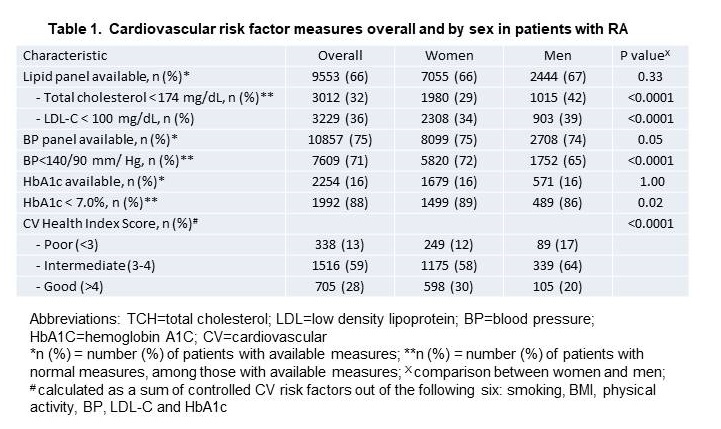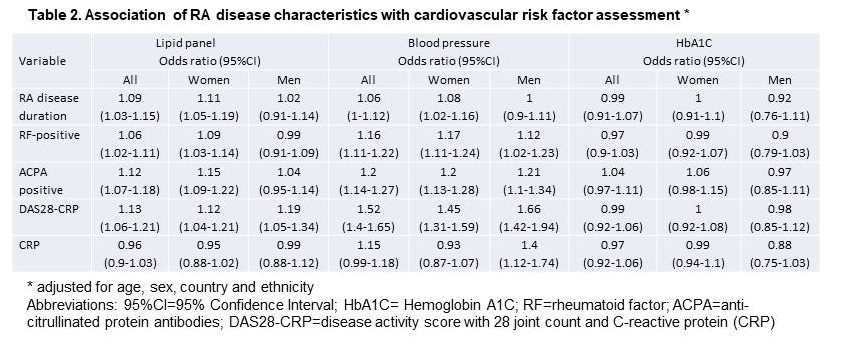Session Information
Date: Sunday, November 8, 2020
Title: RA – Diagnosis, Manifestations, & Outcomes Poster III: Cardiopulmonary Aspects
Session Type: Poster Session C
Session Time: 9:00AM-11:00AM
Background/Purpose: Rheumatoid arthritis (RA) is associated with 2-fold increase in risk of cardiovascular (CV) disease. Extensive evidence from the general population suggests that control of CV risk factors helps in reducing CV morbidity and mortality. However, CV risk factor screening and management has been suboptimal both in the general population and in patients with RA. We aimed to establish whether there is a difference in CV risk factor screening and control of CV risk factors in RA by sex globally, and whether RA characteristics affect the likelihood of CV screening in women and men.
Methods: The SUrvey of cardiovascular disease Risk Factor management in Rheumatoid Arthritis (SURF-RA) is an international clinical audit. The data were collected from rheumatology and cardiology clinics in Western and Eastern Europe, North and Latin America and Asia, using a one-page collection sheet. Information on demographics, CV risk factors (i.e. smoking, body mass index [BMI], physical activity, lipid panel, hemoglobin A1c [HbA1c], blood pressure [BP] measurements) and RA disease characteristics (i.e. serologic status, C-reactive protein [CRP], Disease activity score using 28 joints and CRP [DAS28-CRP]) was collected. Lipid panel and HbA1c were required within 1 year of clinic visit. CV Health Index Score was calculated as a sum of controlled CV risk factors out of the following six: smoking, BMI, physical activity, BP, low density lipoprotein cholesterol (LDL-C) and HbA1c. Normal levels were defined as follows: total cholesterol < 4.5 mmol/L (< 174 mg/dL), LDL-C < 2.5 mmol/L (< 100 mg/dL), BP< 140/90 mm/Hg, HbA1c < 7.0%, BMI < 25.0 kg/m^2.
Results: A total of 14,503 patients with RA from 53 centers in 19 countries were included in the study: mean age 60 years, 75% female, 57% rheumatoid factor (RF) positive, 54% positive for antibody to cyclic citrullinated peptide (ACPA), mean DAS28-CRP 3.0. Information on CV risk factor measures by sex is shown in Table 1. No difference was observed in frequency of assessment of lipid measures, BP or HbA1c. Men were more likely to have normal total cholesterol (p< 0.0001) and LDL-C than women (p< 0.0001). In contrast, women were more likely to have normal BP (p< 0.0001) and normal HbA1c (p=0.02) than men. Women had overall better CV Health Index Score than men (p< 0.0001). Table 2 shows associations of risk factor assessment in patients with RA, adjusting for age, sex, country and ethnicity. Longer RA disease duration, positivity for RF and ACPA, higher DAS28-CRP were associated with higher likelihood of lipid and BP testing, particularly in women, but did not appear to affect the odds of HbA1c assessment.
Conclusion: Women with RA are more likely to have normal BP and HbA1c, resulting in better overall control of CV risk factors, as assessed by CV Health Index Score than men. Patients with RF and/or ACPA, longer RA duration (particularly women), as well as men and women with higher DAS28-CRP are more likely to have lipid panel and BP assessments, suggesting physician awareness of adverse CV risk profile in RA.
To cite this abstract in AMA style:
Myasoedova E, Crowson C, Sexton J, Rollefstad S, Semb A. Sex Differences in Cardiovascular Disease Prevention in Patients with Rheumatoid Arthritis: World-wide Data from the SURF-RA [abstract]. Arthritis Rheumatol. 2020; 72 (suppl 10). https://acrabstracts.org/abstract/sex-differences-in-cardiovascular-disease-prevention-in-patients-with-rheumatoid-arthritis-world-wide-data-from-the-surf-ra/. Accessed .« Back to ACR Convergence 2020
ACR Meeting Abstracts - https://acrabstracts.org/abstract/sex-differences-in-cardiovascular-disease-prevention-in-patients-with-rheumatoid-arthritis-world-wide-data-from-the-surf-ra/


